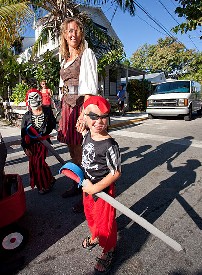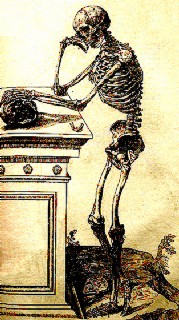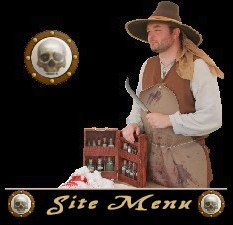
Halloween - Pompions and Ghostly Tales: 1 2 3 4 5 6 Next>>
Pompions, Monsters and Ghosts in the Golden Age of Piracy, Page 1
When you think of Halloween - at least if you're in the United States - the image that may come to mind is of kids running around in costumes some of whom are dressed as witches, zombies, ghosts or pirates. So I thought I'd put together a couple pages on the relationship between

Photo: Brian Lin
Young pirates with their mom at
Fantasy Fest in Key West, 2009
Halloween and period surgeons captured by pirates.
Well... to be fair there really is no direct relationship between Halloween and period surgeons captured by pirates. In fact, Halloween as we think of it today wouldn't have been recognized by someone living in the late 17th or early 18th century. This is not to say that there wasn't an embryonic form of the holiday around at that time. Halloween finds its roots in two holidays - one pagan and the other Christian.
Seasonal changes were usually times for celebration in the pagan culture. Samhain (literally 'summer's end' in Old Irish) is mentioned in some of the earliest Irish literature. Like many early celebrations, traditions gradually built up around this holiday until it became "a time when the 'door' to the Otherworld opened enough for the souls of the dead... [who] were said to revisit their homes on Samhain."2 The Irish "lit bonfires in honor of the dead, to aid them on their journey, and to keep them away from the living."3 Naturally, when spirits start wandering about the countryside, you can't keep the bad ones out of the mix so folks began to take "steps to allay or ward-off these harmful spirits/fairies, which is thought to have influenced today's Halloween customs."4
The Christian version of all this came about when All Hallows (or All Saints Day) was created in 609 AD5

Skeleton Trying to Remember
Where
He Left his Retainer, from
De humani corporis fabrica
by
Andreas Fabrica, p 164 (1543)
by Pope Gregory the first in an effort to ease the pagan conversion to Christianity by celebrating similar holidays.6 It was originally celebrated in May but was switched to November 1st in 835 by Pope Gregory IV in an effort to mirror the already established Samhain.7 All Hallows generated some traditions such as 'souling' - "the custom of baking and sharing soul cakes for 'all crysten christened souls'" which lead to the poor going door-to-door to collect these cakes.8
While All Hallows was a great day for celebrating the souls of the deceased, it didn't have much of a role for the demons. Due in part to this, the Celtic traditions were never fully stamped out by the church's new holiday.9 The night before All Hallows was believed to have a lot of wandering spirits, so it was called All Hallow's Eve - or Hallow Evening which became Hallowe'en.10
Although elements of Halloween pre-date the golden age of piracy and it might be recognized as a 'holiday for the deceased' by a pirate surgeon at this time, I have not found any references to the holiday in period pirate's or sailor's accounts. The tradition of dressing up for the holiday would be foreign to our pirate surgeons because it didn't appear until about 1895 when folks in disguise carried "lanterns made out of scooped out turnips" to visit homes seeking "cakes, fruit and money."11
1 Halloween, wikipedia, gathered 10/24/12; 2 Ibid; 3 The History of Halloween or Samhain, About.com Inventors, gathered 10/27/12; 4,5 wikipedia; 6 about.com; 7 wikipedia; 8,9 about.com; 10,11 wikipedia

